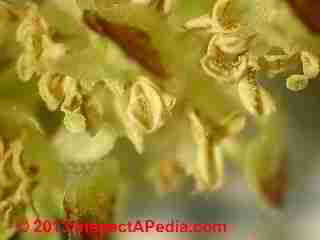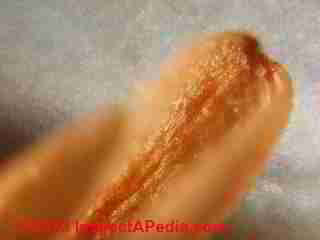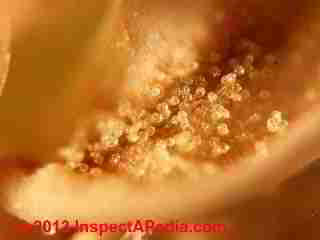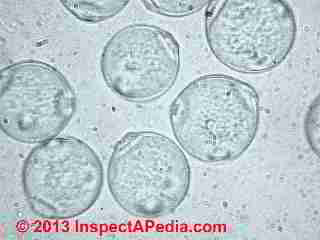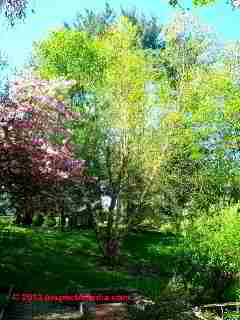 River Birch pollen & tree photographs
River Birch pollen & tree photographs
- POST a QUESTION or COMMENT about anemone pollen, flowers, & microphotography
Birch Pollen:
Photographs illustrate pollen from the River Birch or Betula nigra L. and proceed in scale from the entire tree to its leaves and wind borne pollen flowers to microscopic examination of individual pollen grains for their identifying features.
Ending at 1200x magnification of River Birch - Betua nigra pollen itself we show the identifying features of this beautiful pollen.
InspectAPedia tolerates no conflicts of interest. We have no relationship with advertisers, products, or services discussed at this website.
- Daniel Friedman, Publisher/Editor/Author - See WHO ARE WE?
Photographs of River Birch Trees, Flowers and their Pollen
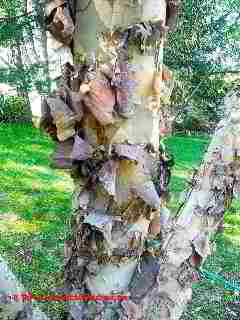
Daniel Friedman
The River Birch or Betua nigra genus and species, a member of the Betulacae family, a perennial tree with beautiful papery bark (photo at left).[2] The Betula nigra is an incredibly prolific producer of pollen in the spring, typically during May.
[Click any InspectApedia image to see an enlarged, detailed version.]
The River Birch is an anemophilous plant - its pollen is spread by wind. This feature is quite evident in our photographs as its dangling pollen 9 cm. long pollen producing structure we show is out there suspended in the breeze, appearing before the tree has fully produced its leave.
This photograph [above] taken in the spring of 2013 is a tree that we planted as a tiny sapling in 1999.
Below we offer a series of closer looks at the River Birch and its pollen.
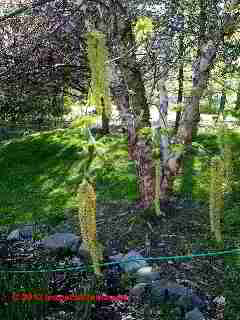
Let's look at the pollen distributing system of the River Birch tree.
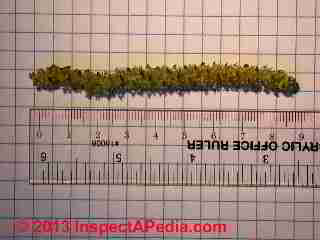
Using the macro close-up facility of a Nikon Coolpix 4500 we've zoomed in on the pollen-producing components of the River Birch.
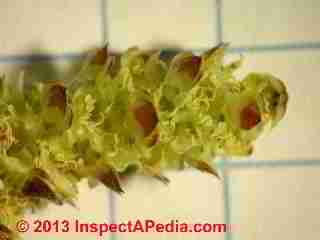
See MICROSCOPE CAMERA SELECTION
More about these photographic methods can be read
at MICROSCOPE DIGITAL PHOTOGRAPHY
It is interesting to note that the leaf, anther and other components of this anemophilous plant were very sticky on the day we collected these flower and pollen samples. The River Birch was not quite ready to release its pollen. When it is, that stickiness diminishes and in the slightest breeze the air will be filled with its pollen.
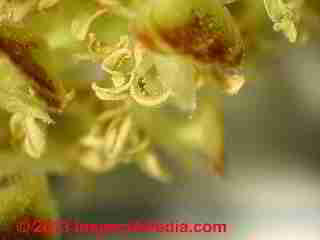
Still under the stereo microscope a magnified view of these pollen producing structures shows pollen grains adhered to just about every surface of the anther and the surrounding flower parts and petals.
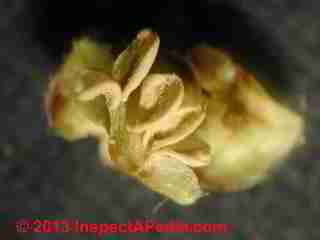
At the magnification below, also taken using our stereo microscope, we begin to see individual pollen grains (below left).
Below under the transmitted light microscope we see the River Birch or Betua nigra pollen in its dry natural form as collected, before applying any mounting media or stain.
I like to see how the pollen is shaped before it has been puffed up by natural moisture (rain or mist) or by lab means such as Calberla's solution.
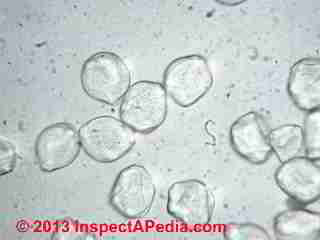
The photograph at below left shows our Betua nigra pollen sample collected from the flower using adhesive tape and mounted in lacto phenol with a dash of cotton blue stain. I like to use this mountant rather than Calberla's to slow the rate of absorption and swelling of the pollen grains.
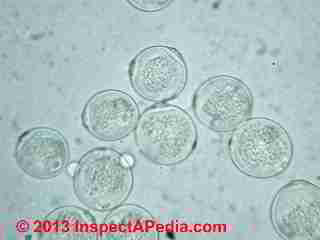
Below I've magnified the Betua nigra pollen to 1200x under the transmitted-light microscope. The identifying features of this pollen are quite apparent and closely resemble the microscopic features other Betula species as well.
(Other images are available on request.)
...
Continue reading at POLLEN PHOTOGRAPHS or select a topic from the closely-related articles below, or see the complete ARTICLE INDEX.
Or see these
Recommended Articles
Suggested citation for this web page
BIRCH POLLEN at InspectApedia.com - online encyclopedia of building & environmental inspection, testing, diagnosis, repair, & problem prevention advice.
Or see this
INDEX to RELATED ARTICLES: ARTICLE INDEX to BUILDING FORENSICS
Or use the SEARCH BOX found below to Ask a Question or Search InspectApedia
Ask a Question or Search InspectApedia
Try the search box just below, or if you prefer, post a question or comment in the Comments box below and we will respond promptly.
Search the InspectApedia website
Note: appearance of your Comment below may be delayed: if your comment contains an image, photograph, web link, or text that looks to the software as if it might be a web link, your posting will appear after it has been approved by a moderator. Apologies for the delay.
Only one image can be added per comment but you can post as many comments, and therefore images, as you like.
You will not receive a notification when a response to your question has been posted.
Please bookmark this page to make it easy for you to check back for our response.
IF above you see "Comment Form is loading comments..." then COMMENT BOX - countable.ca / bawkbox.com IS NOT WORKING.
In any case you are welcome to send an email directly to us at InspectApedia.com at editor@inspectApedia.com
We'll reply to you directly. Please help us help you by noting, in your email, the URL of the InspectApedia page where you wanted to comment.
Citations & References
In addition to any citations in the article above, a full list is available on request.
- Eric Galow, Galow Homes, Lagrangeville, NY. Mr. Galow can be reached by email: ericgalow@gmail.com or by telephone: 914-474-6613. Mr. Galow specializes in residential construction including both new homes and repairs, renovations, and additions.
- Mark Cramer Inspection Services Mark Cramer, Tampa Florida, Mr. Cramer is a past president of ASHI, the American Society of Home Inspectors and is a Florida home inspector and home inspection educator. Contact Mark Cramer at: 727-595-4211 mark@BestTampaInspector.com 11/06
- Roger Hankey is principal of Hankey and Brown Inspections, Winter Park, CO. Mr. Hankey is a past chairman of the ASHI Standards Committee and served in other ASHI chapter and national leadership roles. Mr. Hankey is a National Radon Proficiency Program certified measurement professional and a Level II infrared thermographer. Contact Roger Hankey at: 970-393-6604 - rogerhankey47@gmail.com . Website: www.HankeyandBrown.com Mr. Hankey is a frequent contributor to InspectAPedia.com.
- Arlene Puentes [Website: www.octoberhome.com ] , an ASHI member and a licensed home inspector in Kingston, NY, and has served on ASHI national committees as well as HVASHI Chapter President. Ms. Puentes can be contacted at ap@octoberhome.com
- In addition to citations & references found in this article, see the research citations given at the end of the related articles found at our suggested
CONTINUE READING or RECOMMENDED ARTICLES.
- Carson, Dunlop & Associates Ltd., 120 Carlton Street Suite 407, Toronto ON M5A 4K2. Tel: (416) 964-9415 1-800-268-7070 Email: info@carsondunlop.com. Alan Carson is a past president of ASHI, the American Society of Home Inspectors.
Thanks to Alan Carson and Bob Dunlop, for permission for InspectAPedia to use text excerpts from The HOME REFERENCE BOOK - the Encyclopedia of Homes and to use illustrations from The ILLUSTRATED HOME .
Carson Dunlop Associates provides extensive home inspection education and report writing material. In gratitude we provide links to tsome Carson Dunlop Associates products and services.


